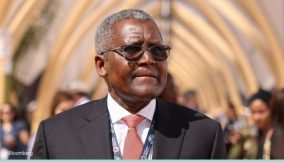The Federal Government has announced a halt to the export of locally produced Liquefied Petroleum Gas (LPG) – otherwise known as cooking gas, from November 1, 2024. This directive, disclosed by Ekperikpe Ekpo, the Minister of State for Petroleum Resources (Gas), seeks to prioritise domestic supply to ease the burden of rising costs on Nigerians.
The decision was made public through a statement issued by Louis Ibah, the Minister’s spokesman, following a high-level meeting in Abuja between government officials and stakeholders in the LPG value chain.
The dialogue focused on the persistent increase in gas prices and the severe impact on households across the country.
Earlier reports from BusinessDay show that the average cost of refilling a 12.5kg cylinder of cooking gas rose by ₦5,099.46 in just one year, from ₦9,162.11 in July 2023 to ₦14,261.57 in July 2024. Despite government interventions, prices have continued to fluctuate, with recent figures indicating an increase to ₦1,500 per kilogram, up from the previous average of ₦1,100–₦1,250 per kg.
In response, the Minister convened a high-level committee in November 2023, headed by the Chief Executive of the Nigerian Midstream and Downstream Petroleum Regulatory Authority (NMDPRA), Farouk Ahmed, to find sustainable solutions. However, with prices still climbing, the government has taken a more drastic step by putting a stop to LPG exports.
Ekpo’s latest directive mandates that all producers, including the Nigerian National Petroleum Company Limited (NNPCL), must cease exporting LPG or import an equivalent amount at cost-reflective prices if exports occur.
Read also: Price of cooking gas increased by 55.66% in one year – NBS
“To stabilise prices, producers will stop exporting LPG from November 1, 2024, or import equivalent volumes at prices reflecting market realities,” Ekpo stated.
The Minister further directed the NMDPRA to collaborate with industry stakeholders within 90 days to develop a domestic pricing framework. This framework will be based on local production costs, as opposed to the current model, which indexes prices against external markets such as those in the Americas and Asia.
The statement highlighted that pricing linked to international markets has forced Nigerians to pay exorbitant rates for cooking gas, despite the fact that the commodity is produced locally.
As a long-term measure, the Federal Government announced plans to develop storage, blending, and distribution facilities over the next 12 months. The export ban will remain in place until Nigeria achieves market sufficiency and stable prices.
“The government remains deeply concerned about the rising cost of cooking gas and is committed to ensuring Nigerians have access to this essential commodity at affordable prices,” the statement read.
The new export ban is expected to bring some relief to households burdened by the rising cost of living. Industry experts believe that prioritising domestic supply and introducing a cost-reflective pricing framework will create more stable gas prices.
Join BusinessDay whatsapp Channel, to stay up to date
Open In Whatsapp





